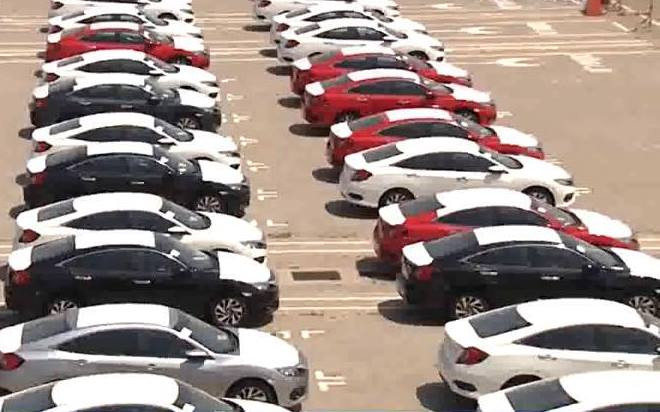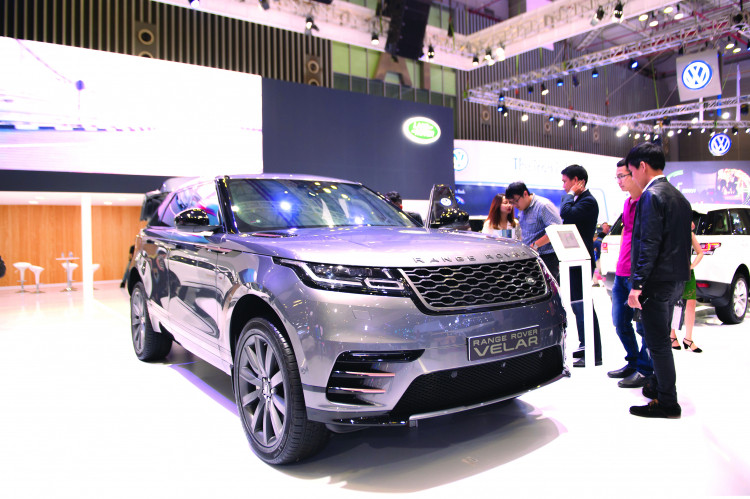Domestically assembled cars maintain prices, customers wait for imported cars
After nearly 3 months of reducing import tax on completely built-up cars from ASEAN to 0%, the domestic car market has just recorded a company that has imported cars and announced the selling price early. Many consumers continue to wait a few more months to have the opportunity to buy cheap cars according to the tax.
Due to difficulties in new business conditions in Decree 116/2017/ND-CP, which requires importing enterprises to provide vehicle type approval (VTA) certificates for export to Vietnam, in the first two months of 2018, the entire automobile market did not record any imported vehicle batches.
Entering early March, the entire market only recorded a batch of Honda cars of about 2,000 units with 4 models imported from Thailand for distribution. This is also the first batch of imported cars to Vietnam since the import tax rate on completely built-up cars from ASEAN was reduced to 0% from the beginning of this year.
Honda Vietnam announced the retail prices of 4 imported models: CR-V, Civic, Jazz, Accord and said that they will deliver the cars in the second quarter of 2018; including the CR-V 2018 model with 3 versions, the selling price for the highest version is 1.5L at 1.068 billion VND, version 1.5G is 998 million VND, the low-end version is 1.5E is 958 million VND.
 |
| Honda Vietnam's imported cars in March 2018. |
Mr. Pham Van Tuan on Giang Van Minh Street (Hanoi) said that he has been attached to the CR-V line for many years now and intended to change to a new car since the end of last year, but he was busy with work so he could not buy the Honda cars that were launched in early 2018, so he still has to drive an old car.
In the same situation as Mr. Tuan, Mr. The Tuyen in Xa Dan street shared: “While I was planning to switch to buying a Mazda CX-5 or Nissan X-Trail, I also heard the news that the new batch of CR-V 2018 cars had arrived with a price nearly 200 million VND cheaper, so I promptly completed the car booking procedure. The dealer announced that they would receive the cars in the next quarter, but I don't know the delivery date, but I'm happy to be able to buy at a cheap price. If I had bought the car at the beginning of the year, now that the price has dropped, it would be considered a loss of nearly 200 million VND"...
Some Honda car dealers in Hanoi said that the price of the latest CR-V is nearly 200 million VND cheaper than the previous batch. Since hearing the news that the cars are about to arrive, many customers have come to place orders, so the supply is still limited. For customers who have signed contracts, the low-end CR-V E version can be delivered next May, while the high-end L version will be delayed by about a month. Customers who are just completing the procedures now may have to wait for the next batch of cars to be delivered.
In this batch of about 2,000 imported cars of Honda, there is the "newbie" Jazz - a small car with 3 versions V, VX, RS with selling prices of 538, 589 and 619 million VND respectively. Compared to the Thai market, these versions are equivalent to 532, 500 and 471 million VND, not a price difference of hundreds of millions of VND as many previous speculations...
In the context that customers have to wait a few more months to buy and receive new imported cars from the region, most of the selling prices of domestically assembled cars remain "stable", in contrast to the price reduction races to stimulate demand like the last months of 2017. Even at the end of February, some best-selling car models on the market such as Kia Morning, Cerato, Optima, Sedona or Mazda CX-5 2018, BT-50, businesses increased their selling prices from several million to tens of millions of VND.
A look at the Hanoi auto market shows that after Honda announced the prices of imported cars, except for Chevrolet, which reduced prices from 15 million to 60 million VND to stimulate market demand, most domestically assembled car models still kept their prices the same or had a small reduction.
 |
| While customers wait a few more months to buy and receive new imported cars from the region, most of the selling prices of domestically produced and assembled cars remain "stable". |
According to the explanation of Nissan, Ford, Toyota... sales staff, the current selling prices of domestically assembled cars have been announced by the companies since November last year and have been applied until now, so they cannot be reduced further. If there is any adjustment, we must wait for the announcement from the manufacturer.
Thus, in the Vietnamese automobile market up to now, only Honda Vietnam has completed the procedures for safety and environmental protection certificates for imported cars supplied by foreign countries (VTA) as required by Decree 116. Honda Vietnam said that this batch of cars has been and is being cleared at the two ports of Ho Chi Minh City and Hai Phong to soon have cars for sale on the market.According to business experts, when the Thai government has provided VTA papers to Honda, it can also provide them to other companies to import cars into Vietnam according to the provisions of Decree 116. In addition to Thailand, Indonesia will also issue VTA papers for cars exported to Vietnam.
However, besides Honda, currently no other businesses have announced importing cars from these markets, the remaining issue is just time. It is possible that by the end of the second quarter, businesses will meet the requirements of Decree 116, at which time imported cars can "invite each other" to the country.
Also related to the problems of Decree 116/2017/ND-CP that prevent businesses from importing cars, the Government Office has just announced the conclusion of Deputy Prime Minister Trinh Dinh Dung at a meeting with businesses and associations on the implementation of Decree 116/2017/ND-CP.
Accordingly, the Government affirmed its stance of treating automobile manufacturers and assemblers equally, without distinction between domestic and foreign enterprises, but with the common goal of developing the Vietnamese automobile industry, meeting market demand and contributing to the country's socio-economic development.
Regarding some opinions reflecting on some difficulties and problems in implementing Decree 116 related to automobile production and import, the Deputy Prime Minister assigned the Ministry of Transport and the Ministry of Industry and Trade to coordinate, preside or co-preside, together with relevant ministries and branches to continue implementing current policies, supporting to remove difficulties for enterprises in business activities.
In addition, it is necessary to control car imports within ASEAN to ensure strict compliance with the conditions for enjoying a 0% tax rate; immediately organize delegations to survey and conduct field inspections to find solutions to remove difficulties and obstacles for businesses (if any)...
Experts say that the Government's direction in removing obstacles for automobile manufacturing and importing enterprises will meet the requirements of fairness and transparency. Specifically, the Government requires that the market's demand for automobiles be gradually met, while protecting the rights of consumers, ensuring safety, protecting the environment, and ensuring the speed of vehicle growth is appropriate to the infrastructure system.
According to the business community, along with the Government's directives, when imported cars enjoy 0% preferential tax, car prices will decrease by 20-25%. This will affect domestically assembled cars, forcing domestic manufacturing and assembly enterprises to reduce prices as at the end of 2017 to increase competitiveness and establish a low price level.

